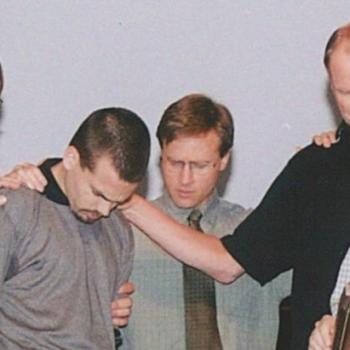St. Benedict is considered the father of monasticism in the west and his rule for life is still used in monastic communities today – 1,500 years after he wrote it! There are three primary rules Benedictine communities hold tightly. One is the vow of conversion (or fidelity) to the monastic way of life, which doesn’t apply to those outside the cloister. The other two are quite fitting for all in ministry today. These two rules are the vows of obedience and stability.
No one likes the word “obedience.” Eugene Peterson confessed when he went to publish A Long Obedience in the Same Direction his publisher asked him to change the title. They thought the word “obedience” wouldn’t sell! They knew that we, as Americans, don’t like to obey. We have rights! We are each the master of our own destiny. You can’t tell me what to do!
We don’t mind obedience when we like the directions we’re given, but we chafe at obedience when we feel an order is beneath us. We disobey when we don’t like our directions and have no respect for our superiors. This happens everywhere, even in ministry. A pastor may leave because he doesn’t like the direction the board is going. A pastor may decide he is “called” to another congregation when the current job description is too restrictive.
I acknowledge there are times when Christians need to disobey men in order to obey God. I also agree it can be in the best interest of the church for a divided leadership to part ways amicably. I also know that often we just don’t like to be told what to do. We don’t like to be corrected. We don’t like to obey.
Obedience naturally leads us to stability. Stability means that we stay put. Some refer to this vow as the vow of permanency. It means you don’t go looking for greener pastures, instead you stay and water the grass where you are. It means you make the most of your situation and learn what God is trying to teach you now.
Stability wears the veneer off and reveals what’s really inside of us. It shows us for who we are – good and bad. It forces us to deal with things like pride and selfishness. How do you get rid of those? Frequently through obedience. For example, I used to HATE moving tables and chairs (I still don’t like it), but I’ve come to embrace it. I realize that God uses obedience in simple (even mundane) tasks like chair stacking to teach patience, humility, and grace.
This is why we are called to obey! Children are called to obey their parents – it teaches them the importance of authority. Adults are called to obey proper authorities – it preserves order in the workplace and society. Ephesians 5:21 tells us that we are all to “Submit to one another out of reverence for Christ.” We are to obey each other out of respect for Christ and in submitting to each other we learn respect for Christ. Obedience reminds us we are not the boss – God is.
So, before you run away from obeying, dig deep and ask, “God what are you teaching me here and now?” Pray that he would give you the strength to remain faithful and obedient. It’s hard, but it’s how we grow. Here’s a blessing for you from Richard Halverson. He prayed this prayer as a benediction frequently over his congregation,
Wherever you go, God is sending you.
Wherever you are, God has put you there.
God has a purpose in your being right where you are.
Christ, who indwells you by the power of his Spirit,
wants to do something in and through you.
Believe this and go in his grace, his love, his power.
In the name of the Father, Son, and Holy Spirit. Amen.













